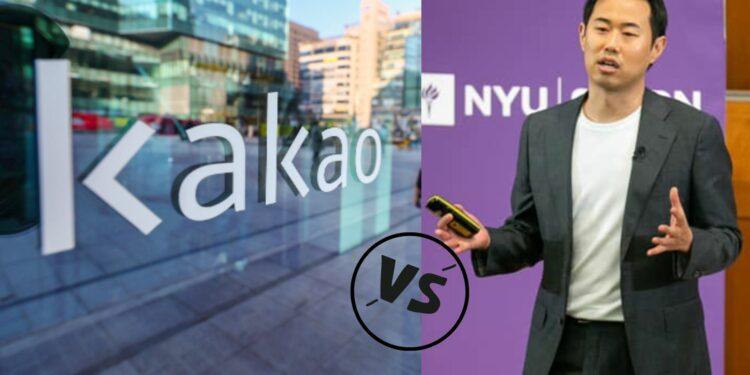In the intricate world of corporate governance, disputes between employers and employees can have profound implications on brand image and internal dynamics. The ongoing legal battle between former Kakao CEO Jihoon Rim and Kakao Ventures over performance-based bonuses, coupled with a recent outburst by the Kakao CA Council manager during an internal meeting, provides compelling case studies, shedding light on complex issues such as internal governance, procedural adherence, and the potential impact of such disputes on a company’s reputation.
The legal battle between Kakao’s former CEO, Jihoon Rim, and Kakao Ventures over performance-based bonus disputes initially surfaced in 2021, with Jihoon Rim demanding nearly 60 billion won ($45 million approx.) performance-based bonuses. Kakao asserted its position for non-payment, contesting the contract’s ineffectiveness in the absence of approval from the general shareholders’ meeting. While Rim has lost in the initial court trial related, he has lodged an appeal with robust claims of discrimination and unfair internal payouts. Concurrently, Kakao remains steadfast in its position.
Bonus Dispute Genesis: Kakao Ventures’ Cryptocurrency Investment
The controversy traces its roots back to Jihoon Rim’s tenure as the CEO of K-Cube Ventures, which later became Kakao Ventures. In 2012, under Rim’s leadership, a fund was raised to invest in promising startups, including the acquisition of shares in Dunamu, the operator of Upbit, a leading cryptocurrency exchange in South Korea. Rim, anticipating the success of the fund, entered into a performance-based bonus agreement with Kakao Ventures, envisaging a significant payout upon the fund’s liquidation.
As time unfolded, Dunamu’s valuation soared amidst the cryptocurrency boom. Rim celebrated the successful investment, but a rift emerged when the time arrived for Kakao Ventures to honour the agreed-upon performance-based bonus. Though Rim had left Kakao Ventures in 2015 to assume the position of CEO of Kakao, he argued for regular performance bonuses based on a separate contract signed earlier. Kakao contended that the contract was ineffective due to a lack of approval from the general shareholders’ meeting.
The Legal Battle: 60 Billion Won Lawsuit Against Kakao Ventures
In March 2021, Jihoon Rim filed a lawsuit against Kakao Ventures, alleging the non-payment of promised bonuses amounting to nearly 60 billion won ($45 million approx.). The dispute pivoted on procedural grounds, with Kakao Ventures asserting that a general shareholders’ meeting approval was necessary for the revised bonus agreement, and the absence of such approval rendered the contract void.
Despite Rim’s claims of email communications outlining the specifics of the performance bonuses in the second half of 2021, Kakao Ventures maintained that the legal procedures for payment were not adequate. Kakao’s position is that Rim did not complete his minimum term of office of four years and that the contract for performance compensation did not go through a resolution of the general shareholders’ meeting and the board of directors. The court eventually ruled against Jihoon Rim, underscoring the necessity for shareholder approval in altering performance compensation contracts.
Selective Bonus: The 26 billion won ($19 million approx) Payment to CEO & VP
The controversy took an unexpected turn when Jihoon Rim disclosed the performance bonuses received by the current management of Kakao Ventures. Accusations of selective bonus payments surfaced, with Lim arguing that he was unfairly excluded from the beneficiaries despite his significant contributions to the fund’s success.
Addressing the issue of selective performance bonus payments, Jihoon Rim revealed, “I can confirm that CEO Shina Chung and Vice President Ki-jun Kim received 26 billion won ($19 million approx.) in performance bonuses. But I was singled out. It is extremely unfair.” Rim also disclosed that Kakao Ventures CEO Shina Chung and Vice President Kim Ki-jun shared specific bonus details and plans through email in the latter half of 2021. However, in an unexpected turn in January 2022, Rim received unilateral notification of the impossibility of payment without detailed explanations.
Whether performance bonuses were paid to CEO Shina Chung and Vice President Kim can be indirectly confirmed in the Kakao Ventures audit report, as per media reports. According to the audit report, the salary paid by Kakao Ventures to all employees in 2021 amounts to 63.1 billion won ($48 million approx.). Considering that the salary scale in 2020 and 2022 was around 1.9 billion won ($1.4 million approx.) and 1.1 billion won ($836k approx.), respectively, it can be said that an unusually large performance bonus was paid only in 2021.
Kakao Ventures’ Internal Practices Scrutinized Amidst Bonus Dispute
This revelation adds another layer to the ongoing scrutiny of Kakao Ventures’ internal practices. Kim Jeong-ho, the general manager of management support at the Kakao CA Council, intensified criticism of internal corruption within Kakao, broadening the scope of the controversy beyond the original bonus dispute.
On November 28, Kim Jeong-ho posted a rebuttal statement on a social media platform, addressing a recently sparked controversy of using abusive language towards an employee at an in-house meeting. In the process of explaining the circumstances surrounding it, he also exposed numerous problems within Kakao.
He explained that a conflict arose over the Kakao AI Campus construction company and that he apologized for the behaviour. In a social media post, Kim also mentioned the problems faced by Kakao. For example, through social media, he mentioned the inconsistent salary system, the ultra-expensive golf course corporate membership worth over 2 billion won ($1.5 million approx.), poor recreational facilities for employees, and insufficient childcare facilities at the Jeju Island headquarters.
Current Status of Bonus Dispute : Jihoon Rim’s Fresh Appeal
In the aftermath of the first-instance court ruling in the lawsuit against Kakao Ventures,Jihoon Rim, former CEO, updated his status on social media sites announcing the submission of an appeal last week. Jihoon Rim reiterated his fundamental position that since Kakao Ventures is a company where Kakao is the sole shareholder, a general meeting of shareholders is not necessary for the contract to take effect.
Rim said, “If we lose the case and it becomes a bad precedent, many companies in the future may complain about various procedural issues and not pay the various compensations that should be paid to individuals,” adding, “This is why I definitely want to appeal and win.”
Jihoon Rim emphasized the broader implications of his legal battle. He asserted that, as an employee, he signed the contract provided by Kakao’s HR Executive and believed it to be a complete and valid agreement. He stressed the significance of his case, expressing concern that if he were to lose, it could set a detrimental precedent, allowing companies to evade various procedural issues when withholding rightful compensation.
Jihoon Rim shared that since 2019, he has been teaching at New York University’s Stern School of Business. Additionally, he has been serving as an external expert advising the US Federal Trade Commission on issues related to antitrust concerns in the tech industry. Beyond this, he established a scholarship foundation last year, providing scholarships to 20 Korean students annually and facilitating programs for student interaction.
As the legal proceedings continue, Jihoon Rim’s appeal seeks to overturn the initial ruling and bring attention to the complexities of procedural adherence in corporate agreements. The case holds broader implications for corporate governance and fairness in compensation agreements.
Broader Implications & Lessons for the Business World
The Kakao Ventures saga serves as a cautionary tale for startups and established companies alike. It highlights the importance of transparent and standardized procedures in contractual agreements, especially concerning performance-based incentives. The intricacies of governance, shareholder approval, and adherence to legal procedures can have lasting repercussions on a company’s reputation and internal cohesion.
As startups navigate the complex landscape of incentives and contracts, the Kakao Ventures controversy underscores the need for clear communication, procedural integrity, and fair practices to maintain a healthy work environment and safeguard the brand image amid legal disputes. The aftermath of such conflicts can leave a lasting impact on the corporate culture and the perception of stakeholders, making it imperative for businesses to prioritize ethical and transparent conduct in all aspects of their operations.
Also Read,
- Check out the Korean startups that have achieved the ‘Unicorn’ status
- Korean Media Reports Disney Korea’s OTT Content Team Dissolves as Disney+ Struggles in Korean Market
- Leading Korean Law Firms providing legal support to English-Speaking foreign startups
- Unveiling Key Lessons for Korean Startups Eyeing Global Expansion from COMEUP 2023
- Top Korean Venture Capital Firms Backing Startup Success
Keep tab on latest news in the Korean startup ecosystem & follow us on LinkedIN, Facebook, and Twitter for more exciting updates and insights.






